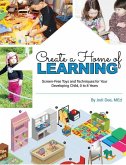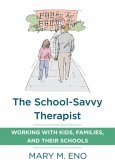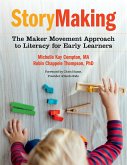Julie Powers
Parent Engagement in Early Learning: Strategies for Working with Families
Julie Powers
Parent Engagement in Early Learning: Strategies for Working with Families
- Broschiertes Buch
- Merkliste
- Auf die Merkliste
- Bewerten Bewerten
- Teilen
- Produkt teilen
- Produkterinnerung
- Produkterinnerung
This second edition of Parent-Friendly Early Learning brings to life real scenarios that care providers face in today's world. How do you turn parent-provider relationships into partnerships? Learn how to improve parent-teacher communication, deal with family issues and special complications, and how to work with the modern family.
Andere Kunden interessierten sich auch für
![Create a Home of Learning: Screen-Free Toys and Techniques for Your Developing Child, 0 to 8 Years Create a Home of Learning: Screen-Free Toys and Techniques for Your Developing Child, 0 to 8 Years]() Jodi DeeCreate a Home of Learning: Screen-Free Toys and Techniques for Your Developing Child, 0 to 8 Years17,99 €
Jodi DeeCreate a Home of Learning: Screen-Free Toys and Techniques for Your Developing Child, 0 to 8 Years17,99 €![The School-Savvy Therapist: Working with Kids, Families and Their Schools The School-Savvy Therapist: Working with Kids, Families and Their Schools]() Mary EnoThe School-Savvy Therapist: Working with Kids, Families and Their Schools33,99 €
Mary EnoThe School-Savvy Therapist: Working with Kids, Families and Their Schools33,99 €![Storymaking: The Maker Movement Approach to Literacy for Early Learners Storymaking: The Maker Movement Approach to Literacy for Early Learners]() Michelle Kay ComptonStorymaking: The Maker Movement Approach to Literacy for Early Learners34,99 €
Michelle Kay ComptonStorymaking: The Maker Movement Approach to Literacy for Early Learners34,99 €![The Redleaf Family Child Care Curriculum Family Companion The Redleaf Family Child Care Curriculum Family Companion]() Redleaf PressThe Redleaf Family Child Care Curriculum Family Companion12,99 €
Redleaf PressThe Redleaf Family Child Care Curriculum Family Companion12,99 €![Nurturing Young Innovators: Cultivating Creativity in the Classroom, Home and Community Nurturing Young Innovators: Cultivating Creativity in the Classroom, Home and Community]() Laura McLaughlinNurturing Young Innovators: Cultivating Creativity in the Classroom, Home and Community31,99 €
Laura McLaughlinNurturing Young Innovators: Cultivating Creativity in the Classroom, Home and Community31,99 €![Bicultural Parent Engagement Bicultural Parent Engagement]() Bicultural Parent Engagement43,99 €
Bicultural Parent Engagement43,99 €![The Diary of Laura: Perspectives on a Reggio Emilia Diary The Diary of Laura: Perspectives on a Reggio Emilia Diary]() The Diary of Laura: Perspectives on a Reggio Emilia Diary26,99 €
The Diary of Laura: Perspectives on a Reggio Emilia Diary26,99 €-
-
-
This second edition of Parent-Friendly Early Learning brings to life real scenarios that care providers face in today's world. How do you turn parent-provider relationships into partnerships? Learn how to improve parent-teacher communication, deal with family issues and special complications, and how to work with the modern family.
Hinweis: Dieser Artikel kann nur an eine deutsche Lieferadresse ausgeliefert werden.
Hinweis: Dieser Artikel kann nur an eine deutsche Lieferadresse ausgeliefert werden.
Produktdetails
- Produktdetails
- Verlag: Redleaf Press
- Seitenzahl: 184
- Erscheinungstermin: 29. März 2016
- Englisch
- Abmessung: 263mm x 254mm x 15mm
- Gewicht: 391g
- ISBN-13: 9781605544380
- ISBN-10: 1605544388
- Artikelnr.: 43896827
- Herstellerkennzeichnung
- Libri GmbH
- Europaallee 1
- 36244 Bad Hersfeld
- gpsr@libri.de
- Verlag: Redleaf Press
- Seitenzahl: 184
- Erscheinungstermin: 29. März 2016
- Englisch
- Abmessung: 263mm x 254mm x 15mm
- Gewicht: 391g
- ISBN-13: 9781605544380
- ISBN-10: 1605544388
- Artikelnr.: 43896827
- Herstellerkennzeichnung
- Libri GmbH
- Europaallee 1
- 36244 Bad Hersfeld
- gpsr@libri.de
Julie Powers has worked with children, families, educators, and communities for over 40 years. She started preschool programs at the Dodge Nature Center in St Paul, MN, an inclusion-based program for Catalina Foothills School District in Tucson, AZ, and was a consultant for the Air Force Child Development Centers. Mrs. Powers has taught at colleges across the country and is currently an associate professor of early childhood education at University of Hawaii Maui College.
Acknowledgements
Introduction
Chapter 1: Developing Relationships with Families
Scenario 1: What is Going on at School? or Building Trust
Scenario 2: Fear of Men, Strangers, and Dangerous Persons, or the Boogeyman
Scenario 3: The Parent Who Drains You, or "Excuse me, but I have some
children here who need my attention."
Chapter 2: Communicating with Families
Scenario 4: Recommending Children for Assessment, or "What is wrong with
Tim?"
Scenario 5: When Parents Don't Read Your Newsletters, or "Why didn't you
tell me she has a field trip today?"
Chapter 3: Policies that Work for Families and Staff
Scenario 6: Parents who Don't Follow School Rules, or "But we're special!"
Scenario 7: Fear of Health Problems Part 1, or The Sun Devil
Scenario 8: Fear of health Problems Part 2, or Typhoid Mary
Scenario 9: The Parent Who Won't Leave, or "How can I miss you when you
won't say good-bye?"
Scenario 10: The Late Parent, or "Is it 6:15 already?"
Scenario 11: The Parent Who Wants Special Treatment, or "If it's not too
much trouble..."
Scenario 12: The Child with Special Needs, or "Why didn't you tell us?"
Chapter 4: Finding Common Values between Home and School
Scenario 13: When Beliefs from home and the Program Don't Match, or
Holidaze
Scenario 14: Controlling Pretend Play, or "Not my son!"
Scenario 15: Fear of Losing Influence over One's Own Child or "Whose child
is this anyway?"
Scenario 16: Separating Twins, or "Why can't my boys be together?"
Chapter 5: Child Development Issues
Scenario 17: Taking School Toys Home, or "My little Jesse James"
Scenario 18: The Parent Who Personalizes her Child's Rejection, or "Then
you can't come to my birthday party."
Scenario 19: The New School Year, or "Where are my daughter's friends?"
Scenario 20: The Child Who Can Do No Wrong, or "Not my baby!"
Chapter 6: Involving Your Director to Work Well with Families
Appendix: Checklist for Analyzing Scenarios
References
Introduction
Chapter 1: Developing Relationships with Families
Scenario 1: What is Going on at School? or Building Trust
Scenario 2: Fear of Men, Strangers, and Dangerous Persons, or the Boogeyman
Scenario 3: The Parent Who Drains You, or "Excuse me, but I have some
children here who need my attention."
Chapter 2: Communicating with Families
Scenario 4: Recommending Children for Assessment, or "What is wrong with
Tim?"
Scenario 5: When Parents Don't Read Your Newsletters, or "Why didn't you
tell me she has a field trip today?"
Chapter 3: Policies that Work for Families and Staff
Scenario 6: Parents who Don't Follow School Rules, or "But we're special!"
Scenario 7: Fear of Health Problems Part 1, or The Sun Devil
Scenario 8: Fear of health Problems Part 2, or Typhoid Mary
Scenario 9: The Parent Who Won't Leave, or "How can I miss you when you
won't say good-bye?"
Scenario 10: The Late Parent, or "Is it 6:15 already?"
Scenario 11: The Parent Who Wants Special Treatment, or "If it's not too
much trouble..."
Scenario 12: The Child with Special Needs, or "Why didn't you tell us?"
Chapter 4: Finding Common Values between Home and School
Scenario 13: When Beliefs from home and the Program Don't Match, or
Holidaze
Scenario 14: Controlling Pretend Play, or "Not my son!"
Scenario 15: Fear of Losing Influence over One's Own Child or "Whose child
is this anyway?"
Scenario 16: Separating Twins, or "Why can't my boys be together?"
Chapter 5: Child Development Issues
Scenario 17: Taking School Toys Home, or "My little Jesse James"
Scenario 18: The Parent Who Personalizes her Child's Rejection, or "Then
you can't come to my birthday party."
Scenario 19: The New School Year, or "Where are my daughter's friends?"
Scenario 20: The Child Who Can Do No Wrong, or "Not my baby!"
Chapter 6: Involving Your Director to Work Well with Families
Appendix: Checklist for Analyzing Scenarios
References
Acknowledgements
Introduction
Chapter 1: Developing Relationships with Families
Scenario 1: What is Going on at School? or Building Trust
Scenario 2: Fear of Men, Strangers, and Dangerous Persons, or the Boogeyman
Scenario 3: The Parent Who Drains You, or "Excuse me, but I have some
children here who need my attention."
Chapter 2: Communicating with Families
Scenario 4: Recommending Children for Assessment, or "What is wrong with
Tim?"
Scenario 5: When Parents Don't Read Your Newsletters, or "Why didn't you
tell me she has a field trip today?"
Chapter 3: Policies that Work for Families and Staff
Scenario 6: Parents who Don't Follow School Rules, or "But we're special!"
Scenario 7: Fear of Health Problems Part 1, or The Sun Devil
Scenario 8: Fear of health Problems Part 2, or Typhoid Mary
Scenario 9: The Parent Who Won't Leave, or "How can I miss you when you
won't say good-bye?"
Scenario 10: The Late Parent, or "Is it 6:15 already?"
Scenario 11: The Parent Who Wants Special Treatment, or "If it's not too
much trouble..."
Scenario 12: The Child with Special Needs, or "Why didn't you tell us?"
Chapter 4: Finding Common Values between Home and School
Scenario 13: When Beliefs from home and the Program Don't Match, or
Holidaze
Scenario 14: Controlling Pretend Play, or "Not my son!"
Scenario 15: Fear of Losing Influence over One's Own Child or "Whose child
is this anyway?"
Scenario 16: Separating Twins, or "Why can't my boys be together?"
Chapter 5: Child Development Issues
Scenario 17: Taking School Toys Home, or "My little Jesse James"
Scenario 18: The Parent Who Personalizes her Child's Rejection, or "Then
you can't come to my birthday party."
Scenario 19: The New School Year, or "Where are my daughter's friends?"
Scenario 20: The Child Who Can Do No Wrong, or "Not my baby!"
Chapter 6: Involving Your Director to Work Well with Families
Appendix: Checklist for Analyzing Scenarios
References
Introduction
Chapter 1: Developing Relationships with Families
Scenario 1: What is Going on at School? or Building Trust
Scenario 2: Fear of Men, Strangers, and Dangerous Persons, or the Boogeyman
Scenario 3: The Parent Who Drains You, or "Excuse me, but I have some
children here who need my attention."
Chapter 2: Communicating with Families
Scenario 4: Recommending Children for Assessment, or "What is wrong with
Tim?"
Scenario 5: When Parents Don't Read Your Newsletters, or "Why didn't you
tell me she has a field trip today?"
Chapter 3: Policies that Work for Families and Staff
Scenario 6: Parents who Don't Follow School Rules, or "But we're special!"
Scenario 7: Fear of Health Problems Part 1, or The Sun Devil
Scenario 8: Fear of health Problems Part 2, or Typhoid Mary
Scenario 9: The Parent Who Won't Leave, or "How can I miss you when you
won't say good-bye?"
Scenario 10: The Late Parent, or "Is it 6:15 already?"
Scenario 11: The Parent Who Wants Special Treatment, or "If it's not too
much trouble..."
Scenario 12: The Child with Special Needs, or "Why didn't you tell us?"
Chapter 4: Finding Common Values between Home and School
Scenario 13: When Beliefs from home and the Program Don't Match, or
Holidaze
Scenario 14: Controlling Pretend Play, or "Not my son!"
Scenario 15: Fear of Losing Influence over One's Own Child or "Whose child
is this anyway?"
Scenario 16: Separating Twins, or "Why can't my boys be together?"
Chapter 5: Child Development Issues
Scenario 17: Taking School Toys Home, or "My little Jesse James"
Scenario 18: The Parent Who Personalizes her Child's Rejection, or "Then
you can't come to my birthday party."
Scenario 19: The New School Year, or "Where are my daughter's friends?"
Scenario 20: The Child Who Can Do No Wrong, or "Not my baby!"
Chapter 6: Involving Your Director to Work Well with Families
Appendix: Checklist for Analyzing Scenarios
References








